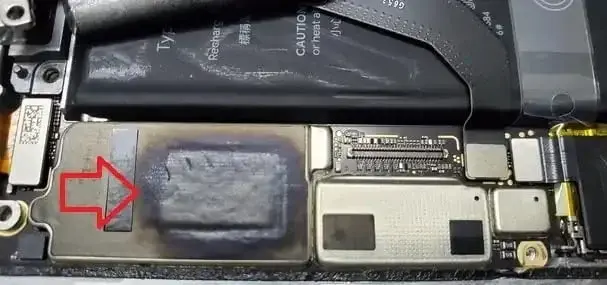Overheating Issue on Google Pixel 6 Pro Raises Concerns
A user on Reddit recently reported an overheating problem with their Google Pixel 6 Pro, which resulted in the thermal paste on the device's original Google Tensor chip burning. Surprisingly, this issue occurred during a mere 10-minute phone call. The user shared an image of the device's internals, revealing burnt marks on the SoC (system-on-a-chip), indicating the excessive heat generated. Furthermore, the heat produced exceeded the heat sink's capacity to keep it within safe limits.
Lower Power Efficiency as the Culprit
The root cause of this overheating problem appears to be the lower power efficiency of the Google Tensor chip. This means that the chip consumes relatively more power and dissipates more heat for a given operation. It is worth noting that Tensor chips, including the original Google Tensor, are manufactured by Samsung's foundry. This inefficient nature of Tensor chips is also observed in Samsung's Exynos chips. Although Samsung's fabrication process has improved in terms of power efficiency, the first Tensor chip dates back three years, when efficiency was even lower.
Throttling Issues and Performance Trade-offs
Despite efforts to improve thermal efficiency, reports indicate that the third version of Google Tensor still experiences throttling during tests, more so than its competitors. To address overheating concerns, Google has prioritized AI-based tasks for Tensor chips and reduced the performance of the Tensor G3 to mitigate overheating issues.
Looking ahead, it is expected that next year's Google Pixel 9 series phones will continue to face power efficiency challenges. This could result in either competitive performance with higher-than-usual temperatures or reduced performance to prevent overheating. Neither of these outcomes is an ideal solution for users.
The Future: Google Tensor G5
Google aims to address these power efficiency issues with the upcoming Google Tensor G5 chip, which is set to be released in 2025. Unlike previous iterations, the Tensor G5 chip will be designed entirely in-house by Google and will utilize the more efficient TSMC 3nm process. This advancement is expected to significantly improve the performance and thermal efficiency of the Google Tensor G5.
Coping with Overheating
In the meantime, if your Pixel phone experiences overheating, it is advised to discontinue the operation causing the excessive heat and, if possible, turn off the device until it cools down. This precautionary measure can help prevent further damage and ensure the longevity of your Pixel phone.


Leave a Reply